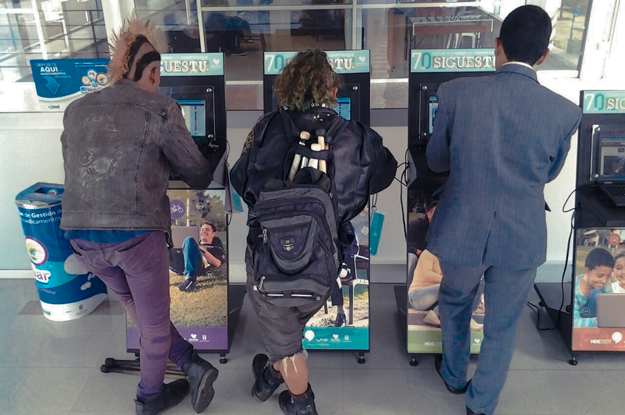Expectant mothers in the poorest areas of Medellín, Colombia, once had to travel far from their neighborhoods for doctor appointments—often spending more money than they earned in a day on transportation. But thanks to the Buen Comienzo (Good Start) program provided by the city government’s Medellín Ciudad Inteligente (Medellín Smart City) initiative, mothers-to-be in the city’s low-income communities—places where access to free Internet is scarce—can now get medical information online at more than 150 public areas that offer computer access, free Wi-Fi and classes. While Internet access doesn’t substitute for an appointment, it can reduce the need for doctor visits and provide supplemental information about pregnancy.
The Buen Comienzo program is one of many information and communication technologies (ICT) projects that Medellín Ciudad Inteligente works on. “It’s a very simple solution that helps the city solve a problem,” says Diego Vélez, director of the organization.
One of over 50 programs sponsored by the city government, Medellín Ciudad Inteligente—known as Medellín Digital when it was founded eight years ago—has been working with government, local universities and social organizations to promote open data and transparent governance, citizen participation, and innovation and cooperation among individuals and communities. “We propose initiatives to the city to help improve [citizens’] quality of life,” says Vélez.
View a slideshow of Medellín Ciudad Inteligente’s work here.
Under Vélez’ direction, the 60-member staff of Medellín Ciudad Inteligente develop ICT infrastructure and conduct workshops in low-income communities to provide access to free Wi-Fi and improve digital literacy. While access to smart-phones lingers at a mere 30 percent in Medellín, organizations like Medellín Ciudad Inteligente have been able to leverage the universal SMS cell phone penetration to advance greater ICT education and use.1 For example, residents can now receive text notifications if they commit a traffic violation or if the deadline to pay a bill or fine is approaching. Medellín Ciudad Inteligente’s website also provides valuable information to citizens, such as a map showing air quality in different neighborhoods.
Once one of the most violent cities in the world, Medellín is now a hub for technology and innovation throughout Latin America, having cut its homicide rate by 80 percent in 10 years while building transportation infrastructure, increasing environmental sustainability and establishing citizen participatory budgeting.2 In 2013, it was named “Innovative City of the Year” by the nonprofit Urban Land Institute—in partnership with Citi and the Marketing Services department of the Wall Street Journal—winning the title over 200 other cities, including global powerhouses like New York City and Tel Aviv.





